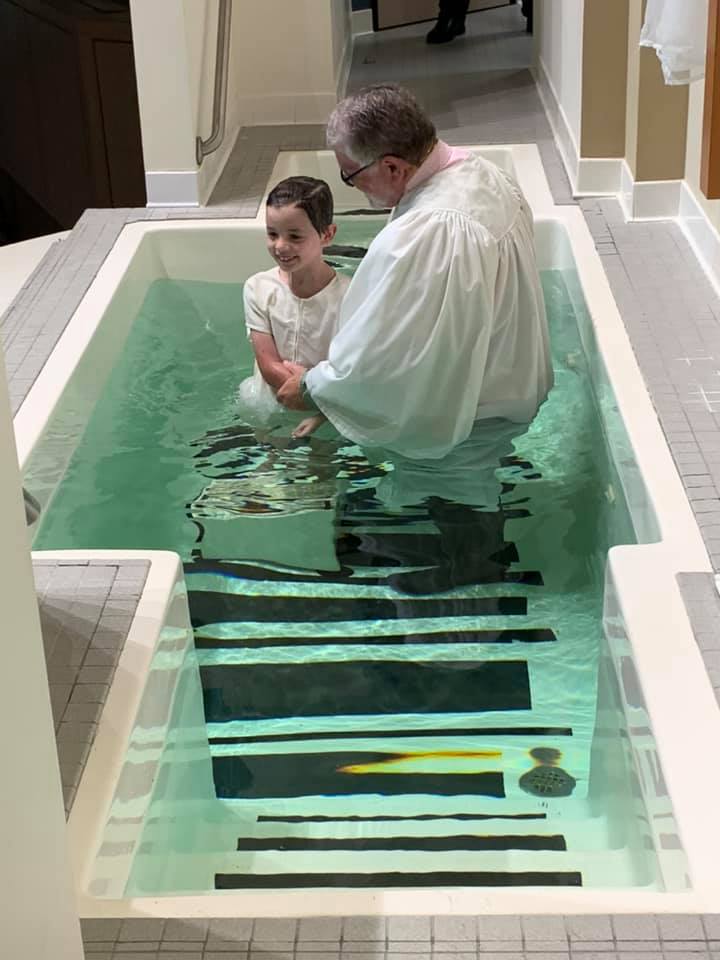Background Passages: Genesis 50:16-21; Romans 5:6,8; Ephesians 2:1-7
Every English teacher I ever had in school harped constantly on the use of strong, active verbs, almost to the point of sucking the joy out of writing.
I can still see that smattering of red ink circles drawn around certain verbs in my essays with a line to the margin indicating, in no uncertain terms, that my teacher was disappointed in my verb choice. I measured the quality of my paper less on the grade and more on the number of times I had to read Ms. Falks’ scribbled note in the margin that just said, “weak.”
I will come out of the closet today and admit that I have always enjoyed grammar. One of my favorite parts of speech is the lowly conjunction. In case you need a reminder, conjunctions are words that link other words, phrases or clauses together. Conjunctions allow a writer to form complex, elegant sentences by avoiding the choppiness of multiple short sentences.
My favorite conjunction is the word but. Its most common usage introduces a phrase or clause that contrasts with another phrase or clause which has already been stated. For instance, “He stumbled, but did not fall.”
But always makes a bolder and grander statement in a sentence than does and, if, or so. When it comes to these statements like these, the bigger, the better.
My thoughts this week germinated during last week’s Sunday School lesson about Joseph and his brothers. Near the end of that biblical narrative in Genesis 50, Joseph’s father Jacob had died. His brothers, who sold him into slavery when he was young, feared that Joseph would seek revenge on them now that Jacob was no longer in the picture.
They concocted a lie, putting words in Jacob’s mouth. Read what the Bible says about it. Look for that conjunctive phrase.
So they sent word to Joseph, saying, “Your father left these instructions before he died. This is what you are to say to Joseph: ‘I ask you to forgive your brothers the sins and the wrongs they have committed in treating you so badly. Now please forgive the sins of the servants of the God of your father.’” When the message came, Joseph wept.
His brothers then came and threw themselves down before him. “We are your slaves,” they said. (Genesis 50:16-18)
Joseph responded to their deceitful plea in an unexpected way.
Don’t be afraid. Am I in the place of God? You intended to harm me, but God intended it for good to accomplish what is now being done, the saving of many lives. So then, don’t be afraid, I will provide for you and your children. And he reassured them and spoke kindly to them. (Genesis 50:19-21)
Did you see it? “You intended harm, BUT GOD…”
What a big but! The words written after but God suggests a biblical truth written in a slightly different manner in the New Testament.
For we know that in all things God works for the good of those who love him, who have been called according to his purpose. (Romans 8:28)
It’s a great lesson, but not today’s lesson.
As I reflected on that lesson last Sunday, those two words kept resurfacing. But God. We see the use of but God or but the Lord at least 61 times in scripture. One thing unfolds, but God uses it to reveal his character, to teach us something we need to learn or accomplish, or to bring about his will or his purpose.
The waters flooded the earth for a hundred and fifty days, but God remembered Noah… (Genesis 7:24-8:1)
My flesh and my heart may fail, but God is the strength of my heart and my portion forever. (Psalm 73:26)
The Lord does not look at the things people look at. People look at the outward appearance, but the Lord looks at the heart. (I Samuel 16:7)
Similar instances occur in the New Testament.
No temptation has overtaken you except such as is common to man; but God is faithful, who will not allow you to be tempted beyond what you can bear. (I Corinthians 10:13)
He said to them, “You are well aware that it is against our law for a Jew to associate with or visit a Gentile. But God has shown me that I should not call anyone impure or unclean.” (Acts 10:28)
Remember Jesus Christ, raised from the dead, descended from David. This is my gospel, for which I am suffering even to the point of being chained like a criminal. But God’s word is not chained.”(2 Timothy 2:8-9)
Study those passages on your own if you choose but notice how the phrase that comes after but God reveals so much about who God is and what he desires for us. The more I find that phrase mentioned in the Bible, the keener I am to pay attention to the words that follow. In every instance, there is a truth I probably need to hear.
The phrase, time and time again, introduces the gracious and compassionate intervention of God. He redeems. He resurrects. He makes all things new. He instructs. He is strength. He provides. He is faithful. When we erect a façade as a barrier to keep the world away, he sees straight into our hearts.
I said all of that to say this. This weekend is Palm Sunday, leading up to our celebration on Easter. There may be no greater use of the phrase but God among Christians than what you find in the Easter narrative.
Here’s the message of Easter in one simple but God statement.
You see, at just the right time, when we were still powerless, Christ died for the ungodly. But God demonstrates his own love for us in this: While we were still sinners, Christ died for us. (Romans 5:6, 8)
The message of Easter is one big but God. All hope seems gone. All seems lost. Then, we see this but God moment on the cross and in the empty tomb. Those words should have been the sign Pilate inscribed for his cross…not “He claimed to be King of the Jews,” but God.… It is the crux of his redemptive work and Paul knew it.
God waited until just the right moment when we could understand the depth of his sacrificial love. When the time was right, he sent his son, even though we were powerless to do anything about it on our own and ungodly in our actions.
This inconceivable act of love was in the mind and heart of our omnipotent creator from the beginning. Even before God brought those first molecules of creation together, he knew his most precious creation would rebel against him. He knew you and I would be steeped in sin and in need of a way back to him. And he provided the way.
Paul testified as much to the church in Ephesus when he wrote these words.
As for you, you were dead in in your transgressions and sins, in which you used to live when you followed the ways of the world and of the ruler of the kingdom of the air, the spirit who is now at work in those who are disobedient. All of us also lived among them at one time, gratifying the cravings of our flesh and following its desires and thoughts. Like the rest, we were by nature deserving of wrath. But God, being rich in mercy and because of his great love for us, made us alive with Christ even when we were dead in transgressions—it is by grace you have been saved.” (Ephesians 2:1-5)
Through an act of unmitigated love and mercy, through an act of grace, you and I, as believers in Christ, experienced our but God moment at some point in our past. We find that the celebration will continue forever, according to Paul’s next words.
But God raised us up with Christ and seated us with him in the heavenly realms in Christ Jesus in order that in the coming ages he might show the incomparable riches of his grace, expressed in the kindness in Christ Jesus. (Ephesians 2:6-7)
This is the ultimate reason for sacrificing his son on the cross. This is his reason for emptying the tomb. He wants us to one day experience his eternal grace…the joy of which is indescribable.
“No eye has seen, no ear has heard, no mind has conceived what God has prepared for those who love him. These are thing revealed to us by his spirit.” (I Corinthians 2:9-10)
“…But God…”
Maybe that’s the message some need to hear today. A simple paraphrase of one of the Bible’s most cherished verses.
But God so loved the world that he gave his only son that whoever believes in him should not perish, but have eternal life.” (John 3:16)
Maybe today can be their “but God” moment, making this Easter even more special.
For those of us who have already claimed that eternal promise and experienced our personal but God moment, what about here? What about now?
Because they reveal to me the character of the God I serve and the life he demands I live, every but God statement in scripture calls me to live a Christ-like life…even when I’m overwhelmed by the circumstances in which I’m living.
Claiming the promises of God is never easy, especially when overwhelming circumstances put us at wits end. You and I will struggle as we try to live as a disciple of Christ. While I don’t always follow through, it has been my experience that we can trust in those but God lessons we find in scripture.
In a recent blog, Lisa Appelo wrote, “But God brings hope when we can’t see a way through. But God means ashes aren’t the end of our story. And but God, not our circumstances, always gets the last word.”
In other words, go back to Joseph’s story, “You intended to harm me, but God intended it for good to accomplish what is now being done…”
That’s the story of Easter. Every but God is his grace gift and promise of eternity in heaven, but it is so much more. It is life abundant. Here. Now. But God is the peace that surpasses our understanding. It is knowing that God walks with us through the good and bad times of life, actively working in all things for the good of those who love him. But God is knowing that he has a plan for us and will actively work in our lives to see it happen in our lives.
For I know the plans I have for you, declares the Lord, plans to prosper you and not to harm you, plans to give you hope and a future. (Jeremiah 29:11)
Wow! Just wow!
But God.




